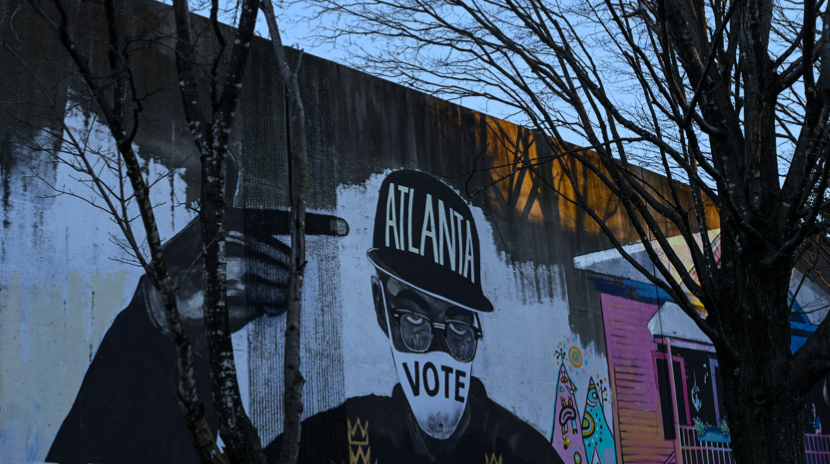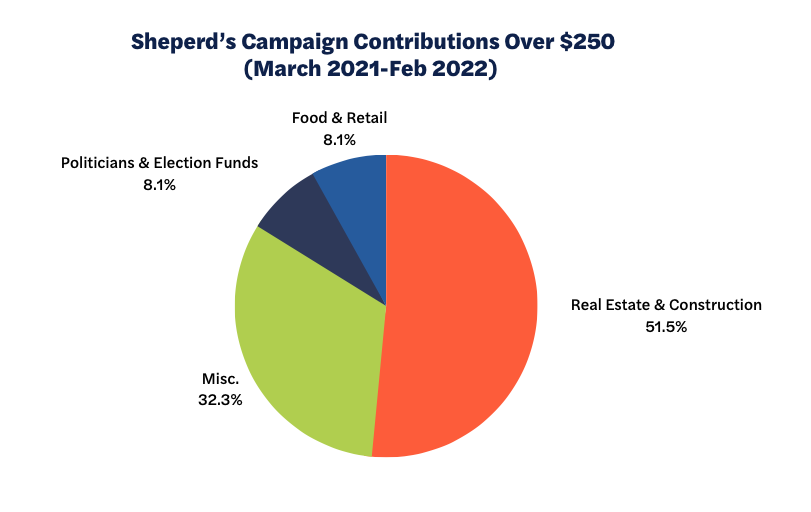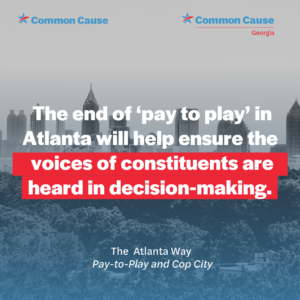
As a part of Common Cause’s ongoing effort to expose the corporate money behind local political decisions, Common Cause researched the connection between donations to former Council member Joyce Sheperd’s 2021 campaign and her introduction of legislation to lease city land to build ‘Cop City’, a $90 million police training facility.
The patterns of play to play are clear and striking in Atlanta. It is well known that business interests can establish a relationship with council members by making contributions of even a couple of hundred dollars. This is often referred to as “the Atlanta way” of doing business.
Pay to Play has unfortunately been the rule and not the exception in Atlanta. In the 1990s, contractors vying for restaurant and shop concessions inside the Atlanta Hartsfield-Jackson International Airport, paid more than $1 million in bribes to Atlanta elected officials. Two former Atlanta city council members were convicted.
Bribes can also come in the form of campaign contributions. In 2017, The Atlanta Journal-Constitution found that people and businesses vying for a package of contracts at the Atlanta airport donated more than $287,000 to candidates for mayor. And as recently as 2022, former Atlanta official was convicted of accepting $10,000 in cash, jewelry, a room at a luxury hotel in Dubai, and landscaping work at her home in exchange for funneling millions of dollars’ worth of city business to PRAD Group Inc., an architectural, design, and construction management and services firm based in Atlanta.
Corporations see city councils as the head of a major bureaucracy, with lucrative potential. This bureaucracy includes departments with budgets that can rise into the hundreds of millions of dollars and thousands of employees. Powerful incumbent council members often have the capability of overwhelming any challengers’ bank accounts with the depth of their donor databases. In many cases, donors have been cultivated for over a generation.
In the 2021 election cycle, Council member Joyce Sheperd, who introduced the ‘Copy City’ legislation, received more than 50% of her donations over $250 from real estate and construction companies and their executives, while an overwhelming number of her constituents voiced their opposition.
Although the full list of vendors that will be involved in the building and operations of the Cop City training facility is currently unknown, the sheer volume of donations shows us that the influence of business interests spoke louder than the voters in the passage of the legislation.

After 18 years in office, Councilwoman Sheperd ultimately lost her bid for re-election, to a candidate who campaigned on shaking up the status quo. However, ousting incumbents is often a mammoth task due to the fundraising advantage that current office holders, especially long serving members, often have.
Across the country, states and localities have taken steps to promote transparent procurement methods through online searchable databases that provide information on tenders, RFPs and bidders. However, time and again our elected officials appear to be influenced by campaign contributions rather than the voices of their constituents — the building of ‘Cop City’ is no different.
The City of Atlanta does not prohibit campaign contributions from businesses interested in government contracts – although it is our position that they should. This “pay-to-play” practice abuses our democracy by buying access to lucrative government contracts and creating incentives for big city-funded projects like The Atlanta Public Safety Training Center (or ‘Cop City’).
Common Cause Georgia recommends Atlanta adopts a Bidder Ban:
- Government contracts should be granted to businesses that serve and acknowledge the public’s calls and even then, they should go to the most effective and least costly companies.
- Government contracts should not be awarded to businesses based on campaign donations to public officials.
- In the interest of good government, the City of Atlanta should establish a policy or ordinance that bans improper influence or the appearance of conflict of interest.
- Contributions and other gifts from commercial entities that do business with the City should be prohibited to avoid conflicts of interest and uphold the city’s ethics.
An open and accountable government allows voters to participate in and understand the decision-making that impacts people and spends government funds. The City of Atlanta’s commitment to transparent procurement processes means keeping the public informed on how contracts are awarded so that people trust that elected officials are acting in their best interests. Voters deserve clarity and accountability around government spending just as much as businesses deserve more competitive, fair, and effective procurement opportunities. We ask that the City of Atlanta council members pledge to support the end of pay to play politics in Atlanta by passing a Bidder Ban.
Proposed Amendment to the City of Atlanta
The City of Atlanta should amend the Procurement and Real Estate Code to:
- Ban donations of over $250 from persons or corporations seeking contracts with the City of Atlanta for one year
- Ban persons or corporations awarded a contract by the City of Atlanta from making donations to candidates for Atlanta City Council
- Require the disqualification of any bid or proposal submitted in violation of the ban
- Terminate any contract with a person or corporation who makes donations to candidates for Atlanta City Council during the term of their contract

Research Methodology
In our research, we define “conflict of interest” as when a public official (e.g., a councilmember) is in a position to receive a personal benefit (e.g., a campaign contribution) from actions or decisions made in their official capacity (e.g., awarding contracts). In analyzing campaign contributions from industries or individuals for this project, contributions of less than $250 were removed from the final tally and analysis. While contributions may create possible conflicts, our focus is directed toward larger donations that may give rise to “the Atlanta way” of doing business, also often called pay to play. Download a copy of the data used here.